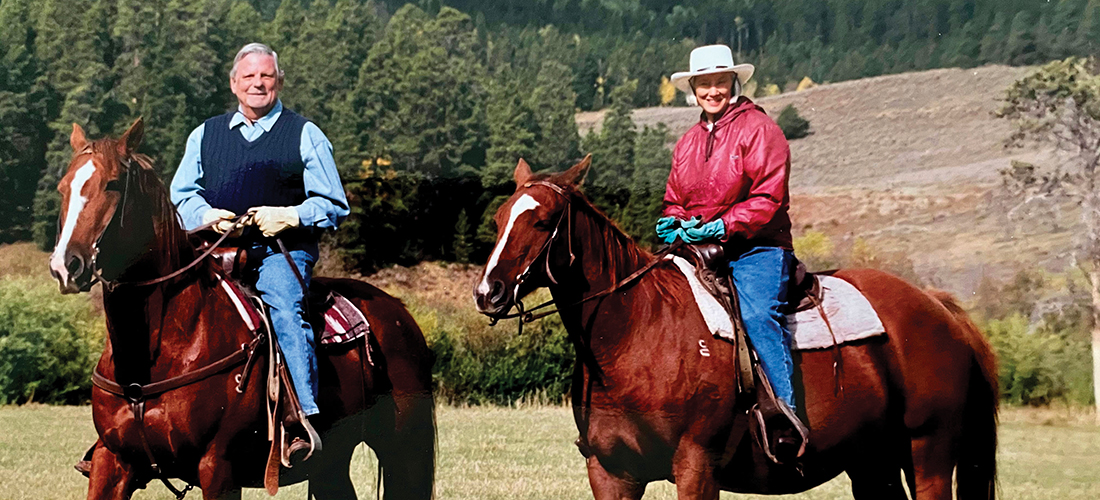
Remembering Marion
She never missed a beat. And I sure miss her
By Billy Eye
Sweet is the memory of distant friends! Like the mellow rays of the departing sun, it falls tenderly, yet sadly, on the heart. – Washington Irving
Marion Hubbard, a dear friend and remarkable woman, passed away a few weeks ago. Marion and her husband, A.P. (Ainslie Perrow), were two of my parents’ closest friends. I’d known them all my life and grew to love them like they were my own family.
The Hubbards lived in a lovely home on Sunset Drive, where they raised their two daughters, Libby and Ada. A.P. was a businessman. For many years, his wholesale lumber company was a prime resource for the city’s leading contractors, supplying wood for homes being built in Kirkwood, Sunset Hills and Starmount Forest. Eventually, A.P. Hubbard Wholesale Lumber blossomed into an international, multimillion-dollar enterprise.
Marion, on the other hand, led the life of a fairly typical Atomic Age housewife. She golfed and dined at the Greensboro Country Club, volunteered with the Junior League, served as a Rotarian, rode horses with the kids, taught Great Books in public schools, attended Holy Trinity Church and traveled the world. She was also a voracious reader, a veritable one-woman lending library filling life’s blank pages with verve, warmth, laughter, love and a keen sense of purpose.
A.P. died suddenly in 1997, when Marion was 68. I interviewed Marion Hubbard in 2016 for an article that was never published. It’s the untold story, in her words, of how she stepped up as CEO of A.P. Hubbard Wholesale Lumber in the wake of her husband’s death. If a movie is ever made of Marion’s life, they’ll have to resurrect Barbara Stanwyck for the lead.
Marion started the tale by saying that just before A.P.’s funeral, someone from the company approached her.
“Marion, you really have to be in the office on Monday,” they told the newly widowed homemaker.
That, she said, got her attention. After all, she knew enough about the current state of the business to know that she could lose a lot of money if she didn’t immediately take charge. “When I went in,” Marion recalled, “one salesperson that works for A.P. came up and said, ‘Well, do you know about my bonus?’”
“Yes, I do know about that,” replied Marion.
“Well, do you know about that job we’re doing down in Charleston?” he retorted.
“I know about that too, yes,” she said.
“Well, do you know about . . .”
This went on and on, she said, always with the same response: “Yes, I know.”
The salesman became so furious his face went red. “Well, A.P. lied to us,” Marion recalled him blurting out. “Your husband said he never talked about business after 5 o’clock.”
“He didn’t,” quipped Marion. “But he came home for lunch!”
As it turned out, that salesperson had assumed — and even told everyone — that he would be in charge in the event that A.P. passed.
This gave me a glimpse into the kind of relationship that A.P. and Marion must have had. Although she was a housewife, Marion had been aware for many years of the inner workings of her husband’s company. For instance, she said they would go into the office together on weekends and A.P. would look over the books and discuss upcoming jobs. “So he really did give me some insight,” she said. “It wasn’t just completely cold turkey.” She felt she had no choice but to take the reins of the business when she did.
“I would be left with all the obligations but none of the benefits if I didn’t,” she told me. “A couple of people in my family told me, ‘Well, you can’t do this.’ And by that, meaning, ‘You’re probably not capable of it.’ Of course, that did not sit well with me.”
There were, she recalled, some immediate, unexpected hurdles. A competitor, who was also a friend, attempted to lure away her most productive salesmen. Also, the bank initially refused to lend her any capital as they normally would have done for the company.
“I suggested to the bank that maybe they were treating me that way because I was a woman,” Marion told me. “They were genuinely shocked. They said, ‘Oh no, it’s because you’re inexperienced.’ Which I thought . . . that’s reasonable.”
Fortunately, A.P.’s life insurance benefit provided the temporary finances to keep commerce, and timber, flowing.
But one challenge followed another, as will happen in business.
Embezzlement? Yep. That, too.
The good news was that sales were “huge, in the millions, but our profit margin was so tiny, I’d be embarrassed to tell you what it was,” Marion said. Because they sold truckloads of product, any mistake was a big, expensive mistake. If a truckload of lumber disappeared, your bottom line could go from black to red overnight. In fact, that actually happened. “A truck driver called and said he didn’t have time to make a delivery,” Marion told me. “So he parked the truck outside his house, and it was gone the next morning.”
Here’s where luck came into play: One of the salespeople was returning to Greensboro from a sales call when, out of the corner of his eye, he noticed something odd. “He makes a U-turn, drives back into the woods and there’s the tractor trailer with the lumber on it!” Beating a hasty retreat, he called the cops who recovered the stolen goods.
She proved to be a tough businesswoman who steered the company successfully through the worst recession since the 1930s. But Marion was always generous, attributing the success to having a low overhead and a dedicated workforce. “We really did have some really good people. We had one of the buyers come in and say, ‘We can’t believe you did this much business out of this little office.’”
The company had its best year in 2015 — so good, Marion said, “it nearly killed us.”
Collecting what was owed her at times presented a challenge. “I talked with this guy in Alabama who had declared bankruptcy. I felt sorry for him, of course, but I said, ‘Oh, you can start over.’”
She was in her late 80s at the time.
“Oh no, Miss Marion,” he told her, “I’m too old to do that.’”
And she said, “How old are you?”
The man was 35.
“My goodness,” said Marion, “You know J.C. Penney started his ten-cent store when he was 75? You are not too old.”
Can you believe he had the nerve to ask how old she was?
He gasped when she told him .
When Marion retired in 2017, A.P. Lumber was one of just a handful of lumber brokers remaining in Greensboro.
I feel extremely fortunate that my sister and I had the opportunity to visit Marion last October. We enjoyed a lovely afternoon talking about times past and folks passed. She certainly didn’t seem like someone who would no longer be with us in just a couple of months.
A true Southern doyenne, I deeply regret that the unsinkable Marion Hubbard isn’t here to read this now. Thankfully her warmth and zest for life live on in memory. OH
Mr. O.G — Original Greensboro — aka Billy Eye would love to hear from you. Email tvparty@bellsouth.net.





